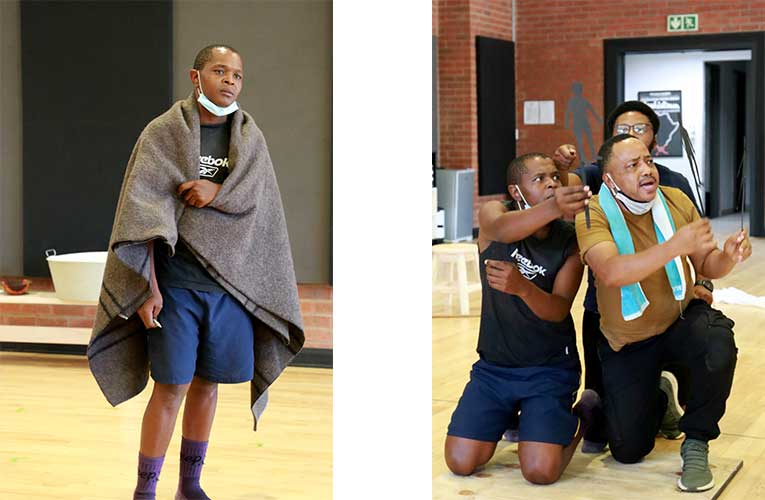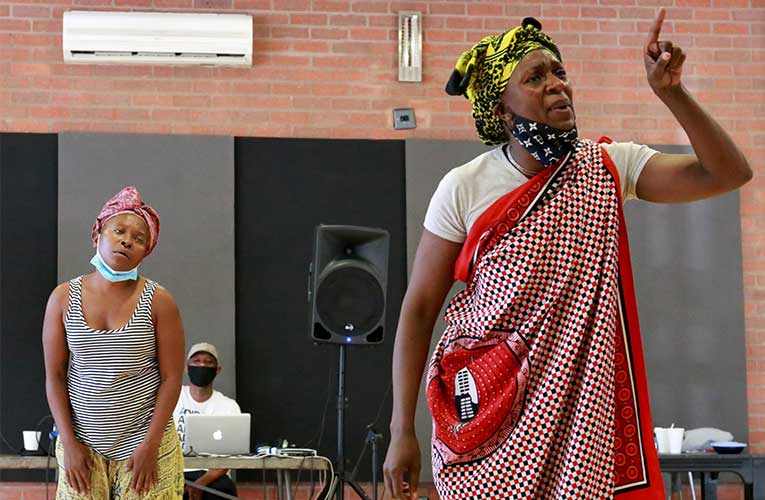Play so South African that it connects easily with audiences
This is irrespective of possible language limitations. It ends at the Market Theatre on Sunday, February 28.
By Edward Tsumele
The lights were dimmed and the theatre went dark. Slowly a sillhoutee of an image of a person dancing, emerged in front of us on the screen.
Then one by one the actors took their place on the stage as the light came back, this time controlled by the lighting technician to put a spotlight on the actors on stage.
After so many months of uncertainty, confusion and frustration of when again we would be able to sit down, relax and engage with words, action and text on stage, we were finally back to normality again. Well, sort.
This is the feeling many of us had at the opening of Father Come Home/Tate Etla Gae, a play adapted for stage by talented playwright Clive Mathibe and translated from Sepedi from its original English by actress Rami Chuene.
It somehow felt strange that we were finally in theatre after so many months of mulling over when was theatre going to be back after its rude disruption by Covid-19 for most of last year as health protocols set in and people were by law not allowed to congregate in large numbers to avoid infection from the coronavirus. But now with restrictions relaxed in level 3 of the risk adjusted Covid-19 preventative strategy developed by government, we can again enjoy theatre.
And of course yes, health protocols were followed upon entry to the Market Theatre complex. Temperature taking, writing down of personal details such as your residential address, your recent travel history and potential exposure incidents and sanitizing. Everything to make sure that none of the 50 people admitted to the theatre could turn out to be super spreaders of the much feared virus.
Once those by now regular Covid-19 protocol were dispensed with, it was time to sit back and enjoy a roller coaster of a show. This play which was adapted from a book by the late man of letters Professor E’skia Mphallele was worth the calculated risk of infection that all of us took to go out and enjoy. It put us at ease, the fact that there was social distancing, particularly for those that they living arrangements were an intimate nature, such as living under one roof or of sharing a bed and sheets. Otherwise If you werea couple that shared blankets, it was fine, you could ignore the social distancing ion the seats and sit tight close together, just like before to take the action on stage in.

This play, delivered mainly in Sepedi, with a sprinkling of an English word here and there, is theatre of a different kind. For one almost the entire show, with the exception of the emotional end, takes place in a rural village in Limpopo. The language is mainly in Sepedi, the first time such a play was ever put up on these theatrestages, and probably the first time such a show was ever on a mainstream stage in the history of theatre in this country.
The play was also full of humour even those with a rudimentary understanding of Sepedi could equally enjoy, as witnessed by sporadic episodes of laugher from the bums on seats, while the play was on. For this play, one should not worry about one’s grasp of Sepedi, one of the minority languages in the country, spoken predominantly in the villages and towns of Limpopo. A lose grasp of any Sotho based language such as seSotho or seTswana, should see you through this play fairly effortlessly, enjoying as much as those that lay a claim to it as their mother tongue.
The staging of this play, and certainly many others in minority languages such as xiTsonga, Tsivenda (also predominantly spoken in Limpopo, and isiNdebele, and isiSwati, spoken predominantly in Mpumalanga should be encouraged. This play’s strength is not just the story itself, but its ability to take the audience right into the depth of Sepedi culture, again demonstrating the fact that indeed South Africa is a diverse country, and we will do better as a country to explore our diversity and embrace it through the arts. We lose nothing, but gain more with regard to understanding the totality of the complexity of South African culture. And its diverse people.
It is notable that the often heavily criticized Department of Sports, Arts and Culture, is the one funding this play under its Incubation Project, and runs until –February 28, 2021.
“The Market Theatre is delighted to produce works of this literary giant and celebrate his contribution not only to the South African writing body of work but more to humanity. Mphahlele had a beautiful obsession with humanity and stories that came out of his immediate communities. 17 December 2019 was Eskia Mphahlele centenary, 2021 will mark 41 years since he wrote one of his seminal works Chirundu. Bringing back old voices that have been re imagined by young thespians is part of the 45 years celebration theme The story unfolds as we looking into the future of what the spaces represents for young artists” says James Ngcobo – Artistic Director Market Theatre Foundation.
Tate etla Gae/Father Come home follows the life of a young Pedi boy, Maredi, who grows up in a remote village of Sedibeng in the Northern Transvaal without a father. Growing up in a traditional village where manhood is defined by family/clan names and the cultural rites of passage, Maredi grows an emotional and desperate need to define himself through knowing his father.
When his question ‘When is tate coming home?’ is repeatedly not answered to his satisfaction by his elders, Maredi’s restless soul leads him to venture into strange lands in several failed attempts to find his father. His last quest to find his father sees him journey through the dry and hot Transvaal, where he finds himself working as a farm boy in order to make some money to enable him to travel the rest of his journey.
After an envoy is sent for Maredi, he agrees to go back home- especially as his mission to find his father bore no fruits. The lost son is pleasantly surprised when he arrives to his homestead to know that his father has made contact and that he and his mother will make their way to see him. However, when Maredi finally meets his father, he is disappointed that his yearning is not completely satisfied- and that his father’s presence doesn’t do much to settle his restless soul.
And so this story by Mphahlele the South African writer, educationist, artist and activist celebrated as the Father of African Humanism and one of the founding figures of modern African literaturetells a story fo familiar in the South African social and historical contest.
This is the story of migration, social displacement, poverty and inequality that often drives black men to leave their villages and home towns into the city to work in mines and as domestic helpers for mainly white households with better incomes and standards of life.
Many who will be lucky enough to catch this play before it closes on Sunday, will connect easily with the issues tackled beautifully by the director and his cast.
PRODUCTION INFORMATION CREATIVE TEAM
Writer Es’kia Mphahlele
Writer – Translator Rami Chuene
Writer- Adaptor and Director Clive Mathibe
Set & Costume designer mentor Onthatile Matshidiso
Lighting Designer mentor Hlomohang Mothetho
Sound Designer mentor Mandla Mkaba
Stage Manager mentor Mokokobale Makgopa
Department of Sports Arts and Culture Incubatees
Set Designer mentee Antonie Adams
Lighting Designer mentee Rendandi Nekhudzhiga
Costume Designer mentee Bohlokoa Matlabe
Sound Designer mentee Lebogang Rammala
Stage manager mentee Kekgaogetswe Rakopa
Performers
Tau Maserumule
Shoki Mmola
Marcus Mabusela
Josias Moleele
Kedibone Manyaka
.Father Come Home/Tate Etla Gae is on at the Market Theatre till Sunday, February 28, 2021.











